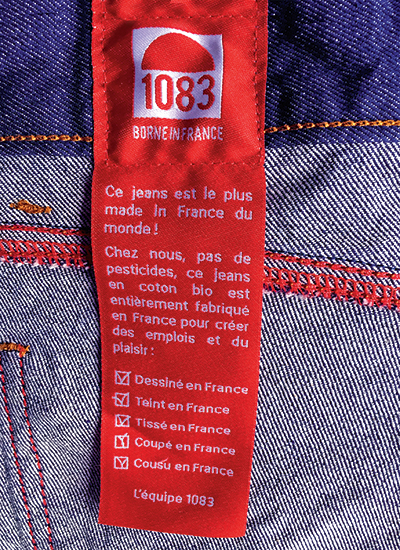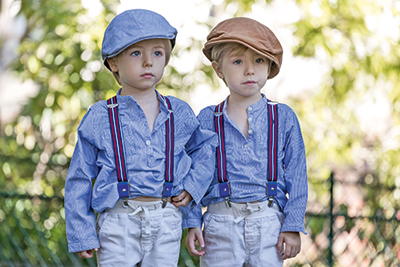Factories are timidly returning to the French landscape. In the first six months of 2018 thirty five of them cropped up! While this doesn’t constitute a full-fledged dawning of a bold new day, it does offers a few encouraging rays of light. The Hexagon (that’s France to the French) lost more than 600 factories in the past ten years. In 2009 alone 224 were abandoned. Neighboring Germany is a completely different story. In this same period, 2008 to 2018, Germany’s industrial production increased by 25%, while France’s industrial activity declined by 3 % according to Trendeo, a firm which monitors French employment and investments. But now with these new factories we have a a promise of better days ahead. A further indication of this renaissance can be seen by taking a look at the annual trade fair Made in France. MIF, the brainchild of Fabienne Delahaye, launched its first edition in 2012 with 80 stands and 15,000 visitors. The 2018 edition held in November at the Porte de Versailles exposition park boasted 450 stands with 65,000 visitors. If this entrepreneurial trend continues, the re-industrialisation of France could well be on track. We visited the fair to see for ourselves. What follows is an eclectic sampling of French production creativity and entrepreneurs on the move. Many are startups but not all. For more you can check out our Made in France diary for 2019
1083 Borne in France: Jeans and shoes
Wondering about the odd name 1083? It turns out that 1083 kilometers separate France’s two most distant cities: Menton in the southeast and Porspoder a small village north of Brest in the northwest. “Borne in France” is a clever double entendre using born(e) to underscore the Made in France aspect which is then reinforced by the word and image of a borne. For those who do not drive the hexagonal highways a borne is a stone or concrete roadside signage element intended to identify the road and to indicate distances to neighboring localities. They are found along old national and departmental arteries. Created only 4 years ago, the 1083 jeans brand boasts 2 million euros in sales today. Thomas Huriez, the young founder, hired about fifteen people from the region Romans-sur-Isère which was once the capital of shoe manufacturing before being hit hard by a wave of relocations. His made in France initiative has graced headlines in economic publications and the national press. Priced between 89 and 129 euros. www.1083.fr
Nap & Up: Power nap at work
Nap & Up has been developing 100% French napping cocoons for the past two years. The cocoon features complete visual isolation. Bring this to the attention of your boss when requesting installation of a napping area in your work place. It has been proven that power napping is an important performance factor, it reduces stress and allows concentration to increase and regulates people’s temper. In siesta we trust! nap-and-up.com
Vertical: Trendy Suspenders for men and women, leather and plaited belts
San Francisco, Fall 2014: « Hey what’s up my man? Those suspenders are way too cool. Where did you get them? » This often-heard remark lies behind the launch of Vertical l’Accessoire in December 2015 recounts Hubert Martin, dynamic and trendy entrepreneur par excellence. Travelling around Canada, South America and the USA for 5 years Hubert often accompanied his simple outfits – jeans and a t-shirt – with a pair of suspenders. Day in and day out and wherever he went, his cool suspenders were a knockout. And they continue to be! vertical-laccessoire.com
Maroquinerie Philippe Serres: Fine leather goods (maroquinerie)
The family-owned leather goods company SERRES is more than eighty years old. It is located in Graulhet, a couple dozen kilometers from Toulouse. The current director represents the fourth generation of leatherworkers devoted to beautiful and authentic French craftsmanship. Briefcases, tote bags, purses, men’s bags, sacoches (satchels) billfolds, change purses…all come in gorgeous colors of red to gold, marron (chestnut) to loutre (dark brown). Website in French only. philippe-serres.com
Confort ID: Pillows and backrests
To get on cloud nine requires a good, comfortable pillow. A Confort ID pillow is personalized to your morphology – it adapts to you and not the other way around. How does this work? A choice of modular cores allows you to change the thickness and support the pillow provides. To find the right core you take a short quiz. Furthermore, the ability to remove material on the soft side of the pillow allows for variations of its overall height. You create the pillow that suits you best. Questions about the tricky art of finding the right pillow for you can be directed to the helpful and very friendly Arnaud Courtel, a young man who counts more than one relaxation therapist (aka sophrologist) amongst his friends. Handmade in France. Bienvenue dans les nuages. Site: confort.id
French Oui: Selection of French products made in France
FrenchOUI is a selection of French brands and products made in France: fashion, home, beauty, lifestyle and sport. You’ll find unusual, innovative and quality products. Frenchoui bills itself as much more than a shop with its eco-citizen and eco-responsible approach. boutique.frenchoui.fr
Coutellerie Cognet: Knives
The douk-douk is a French-made pocket knife of simple sheet-metal construction. It has been manufactured by the Cognet cutlery firm in Thiers France since 1929. The great Gaston Cognet, the douk-douk creator, intended it for sales to France’s overseas colonies in Oceania.The unique handle depicts a «douk-douk», or a Melanesian spirit incarnation. Where did Gaston get the design idea ? He found the name and design by randomly opening an illustrated Larousse dictionary. (What’s the French word for serendipity? Sérendipité!) Coutellerie Cognet has continued to produce the knife up to the present day, using the same simple methods. Today they are offered with several decorative designs, stainless or carbon steel blades, and in three different sizes. www.coutellerie-cognet.com
Gautier: Furniture
The Gautier furniture range covers bedrooms, living rooms, children, dining, storage and other accessories. Gautier started operations in 1960 spearheaded by Patrice Gautier a woodworker and his entrepreneurial wife Annick. With the baby boom in full swing, Patrice – a visionary – imagined his first children’s bedrooms. The boom enabled the company to become a leader in the junior market in only a few years. The originality and quality of Gautier furniture has since built the brand’s reputation. This creativity remains Gautier’s strong point. It has three integrated manufacturing facilities in the Vendée region spread producing 15.000 units every day. The company signature “Meublez, Vivez” translates to something like “load up the house and live”. www.gautier-furniture.com
Le Jardin d’Orante: Pickle production
The word, « cornichon, » is the diminutive of the French word, « corne », which is from the Latin « cornu ». « Corne » is translated to English as « horn, » and refers to the horn of an animal, thus the pickle is named for its little horn-like shape. Reviving large-scale production of pickles in France is the ambitious project of the Jardin d’Orante. Most pickles today are produced in India, Germany, Turkey and the United States. Our French gherkin specialists have taken up the challenge of reestablishing this exceptional fruit in France on a large scale. You’ll be pickled tink to know that the Jardins d’Orante have met with success since 2016 thanks to strong and equitable partnerships between farmers, manufacturers, distributors and suppliers. Progress stats: 2016 — 2 farmers, 3 hectares, 54 tons produced. 2017– 5 farmers, 10 hectares, 137 tons produced. 2018–11 farmers, 17 hectares, 204 tons produced. We hear there are also more and more pickle jokes going around… Q: What does an agreeable pickle always say? A: I relish the idea! www.cornichonsfrancais.fr






